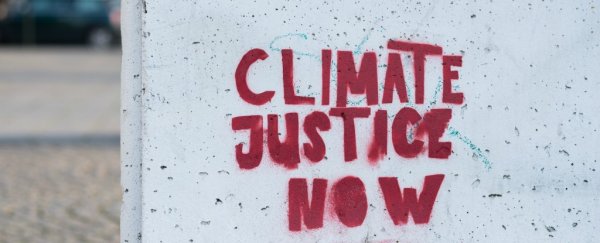President Donald Trump's administration has sent mixed signals regarding a new report that the US may stay in the Paris climate accord.
The Wall Street Journal reported on Saturday that at a meeting in Montreal, US officials broached the idea of a compromise that could keep the country in the global agreement if the country's commitment to reducing greenhouse gas emissions was lowered.
In response to the report, top administration officials have leaned heavily on the ambiguity in Trump's announcement on Paris in June, emphasising that the president said he would be open to renegotiating the deal.
The White House pushed back on the framing of the report as an official shift in the administration's policy.
"There has been no change in the United States' position on the Paris agreement. As the President has made abundantly clear, the United States is withdrawing unless we can re-enter on terms more favourable to our country," White House press secretary Sarah Huckabee Sanders told Business Insider in a statement on Saturday.
Sanders also wrote in a tweet that the administration had always said there was a possibility the US could stay in the agreement, which 195 nations signed in 2015 to keep the planet from warming by what scientists believe is a key threshold.
Our position on the Paris agreement has not changed. @POTUS has been clear, US withdrawing unless we get pro-America terms.
— Kayleigh McEnany 45 Archived (@PressSec45) September 16, 2017
Appearing on "Fox & Friends" on Sunday, Trump counsellor Kellyanne Conway dismissed the sourcing of the report, saying "somebody representing the EU made some noises," and that the Trump "hasn't changed at all" on Paris.
"Go back and look at all of his reasons for withdrawing in the first place. None of that has changed as far as we can see," Conway said.
The 'president's ears are open'
But other advisers seemed to send more mixed messages.
Speaking to "Fox News Sunday," National Security Adviser H.R. McMaster said Saturday's piece was a "false report", but said the "president's ears are open" if other nations want to renegotiate the deal.
And in an interview on "This Week", McMaster argued that the agreement was in fact not strong enough for Trump, saying the Paris pact "gave the biggest polluters, the biggest carbon emitters, a free ride," while simultaneously arguing the accord didn't carve out any space for "clean fossil fuels."
But he refused to say the US will definitively leave the agreement, emphasising that in his speech announcing his departure from the deal, Trump "left the door open to reentering at some later time if there can be a better deal for the United States."
"I would just go back to what the president said," McMaster said. "He's open to any discussions that will help us improve the environment, that will help us ensure energy security, and will advance our prosperity and the prosperity of American workers and American businesses."
"So is is possible the United States would stay in if you can get a new agreement?" host George Stephanopoulos asked.
"If there's an agreement that benefits the American people, certainly," McMaster said.
Secretary of State Rex Tillerson also attempted to thread the needle, saying Trump would not entirely rule out staying in the agreement.
In an interview on "Face The Nation," Tillerson emphasised that National Economic Council director Gary Cohn was developing ways for the US to "be helpful" outside of the agreement, though he did not specify any ways the US would commit to reducing carbon emissions.
Trump specifically took issue with the US goal in the agreement of reducing greenhouse gas emissions by 26 percent to 28 percent by 2025.
"I think the plan is for director Cohn to consider other ways in which we can work with partners in the Paris climate accord," Tillerson said.
But Tillerson also added that "under the right conditions" the US could stay in the accord.
"The president said he's open to finding those conditions where we can remain engaged with others on what we all agree is still a challenging issue," Tillerson said.
When he announced the US departure in June, Trump's request to renegotiate the Paris climate accord was ridiculed and dismissed by other world leaders.
Other countries and world leaders roundly rejected Trump's request to renegotiate the deal, which took years to finalise.
Since then, the president has teased that the US could remain in the agreement. During a visit to Paris earlier this year, Trump told reporters, "Something could happen with respect to the Paris accords; let's see what happens."
Though the US last month officially sent a letter to the United Nations officially announcing it would withdraw from Paris, the State Department said the US would continue to participate in climate change meetings during the years-long withdrawal process.
Because of the way the Paris agreement was designed, it will take years for the US to fully exit it. According to its rules, the earliest Trump could officially exit the pact would be 4 November, 2020 - the day after the next presidential election.
This article was originally published by Business Insider.
